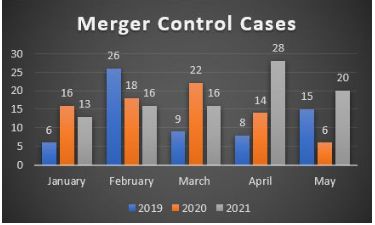
WhatsApp waves white flag in Turkey
WhatsApp withdrew its updated terms of use and privacy policy after strong reaction from both users and authorities in Turkey. You can find the last piece of our WhatsAppocalypse here.
As known, WhatsApp updated the terms of use and privacy policy that includes data sharing, and requested their users to approve the mentioned data sharing. Consequently, the TCA had issued an interim injunction on January 11, 2021, against WhatsApp on this front. Subsequently, the updated terms of use and privacy policy planned by WhatsApp was delayed globally until May 15, 2021. With the official public release, it is now established that the new update will not come into effect for any user, including the users who have previously approved the new terms and conditions in Turkey.
The TCA published its preliminary report on e-marketplace platforms
The TCA published its preliminary report regarding its on-going Sector Inquiry on E-Marketplace Platforms on May 7, 2021. The TCA requested information from 9 (nine) e-marketplaces, 6 (six) cargo companies and conducted a survey to determine the consumers' preferences. As a result, the preliminary report has published the report.
The comprehensive 354-pager report includes the definition of e-commerce activities, examines the development of retail e-commerce over the years alongside the factors affecting its development, provides an overview of the global development of e-marketplaces and the business models of Amazon and Alibaba and demonstrates the current situation of the e-marketplaces in Turkey. The report discusses the position of e-marketplaces from the consumer perspective and the basic economic characteristics of e-marketplaces, determines the possible competition problems arising from e-marketplaces.
The report also highlights that the risk of the monopolisation for the e-marketplace platforms is higher than traditional sectors due to network effects. Since e-marketplaces have different features, the traditional competition law tools may be inadequate. The Report also states that they have received countless complaint petitions regarding e-marketplaces regarding the e-marketplaces abusing their strong positions in the market. The Report prefers the expression "strong position" instead of "dominant position" which suggests that this may stipulate a lower threshold compared to the threshold of "dominant position" which 40% of the market.
As a result, the preliminary report provides the following recommendations for prominent competition concerns:
- The current laws and secondary legislation may be modified.
- A code of conduct which ensures transparency for all agreements may be determined data portability and multihoming options may be made in a smooth way.
- Gate-keeper may be regulated.
The President Mr. Kule signals for a new guideline on the labour market
The President of the Turkish Competition Authority Mr. Birol Kule made a statement on May 5, 2021, regarding the labour market after launching the investigation against 32 - mostly innovation-based - technology companies in April.
Within the scope of his statement, Mr. Kule stated that the issue on the labour market is not a new matter, currently, there are two ongoing investigations; the first investigation is related to competition issues in some hospitals, and the second investigation is related to technology companies. Lastly, Mr. Kule highlighted that the Board will start working on guidelines to ensure legal certainty.
The Board has the final word on Unilever Ice-Cream Case
In the reasoned decision, the Board concluded that Unilever Turkey was, in a dominant position in the industrial ice cream market, instant ice cream market and home ice cream market, in Turkey. It was consequently acknowledged that Unilever Turkey abused its dominant position by implementing various discount systems. Unilever Turkey had breached the Turkish Competition Law by creating de facto exclusivity and preventing the sale of competitor's products at final sales points.
The Board explained in its reasoned decision that Unilever Turkey had also a non-compete clause, which had been prohibited by the previous Board's decision dated May 15, 2008, was included in the contract executed between Unilever Turkey and Getir (an online groceries delivery company).
During the investigation, Unilever Turkey submitted a commitment package containing proposals to eliminate the identified competition problems. However, the Board rejected the commitment application based on the grounds that it fell short in resolving the identified competition issues. Together with the monetary fines, the Board decided to apply a behavioural remedy on Unilever to share its ice cream refrigerators with its competitors.
The content of this article is intended to provide a general guide to the subject matter. Specialist advice should be sought about your specific circumstances.



